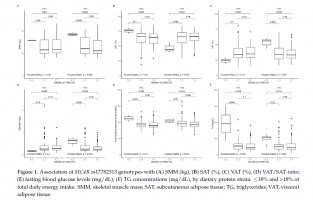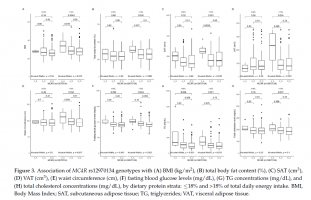Many factors lead to the development of obesity and its metabolic consequences, including excessive energy intake and insufficient energy expenditure, as well as genetic factors. Genetic factors may be associated with the feeling of hunger and satiety and the metabolism of energy substrates. However, simple obesity should not be treated as a disease of a genetic basis only, since it is a consequence of the interaction between lifestyle and genetic factors. In the brain centers involved in hunger and satiety regulation, the melanocortin-4 receptors (MC4R) are expressed, and they play an important role in many metabolic pathways and in the central regulation of energy balance. Rare mutations in or near the MC4R gene have been associated with monogenic obesity; however, most cases of obesity and its metabolic consequences, such as type 2 diabetes mellitus, result from multifactorial interactions.
In the paper: “An Association between Diet and MC4R Genetic Polymorphism, in Relation to Obesity and Metabolic Parameters—A Cross Sectional Population-Based Study” published in the International Journal of Molecular Sciences, researchers from the Clinical Research Center analyzed the relationship between some of the common single nucleotide polymorphisms (SNPs) of the MC4R gene and obesity and selected metabolic parameters depending on the dietary factors. In a group of 819 participants, some common SNPs of the MC4R gene (rs17782313, rs12970134, rs633265 and rs135034) were genotyped. Additionally, anthropometric measurements, including body fat content and distribution (subcutaneous and visceral adipose tissue) were measured. Moreover, selected biochemical parameters (blood glucose, insulin, total cholesterol, LDL and HDL cholesterol, and triglycerides concentrations) were evaluated, and the daily energy, proteins, fats, and carbohydrates intake were obtained. The conducted study showed that if a daily protein intake was ≥ 18% in the CC genotype carriers (rs17782313), the total daily energy intake, the visceral adipose tissue, as well as fasting blood glucose and triglycerides were significantly higher. In the CC genotype carriers (rs12970134), increased energy derived from dietary proteins was associated with higher BMI, adipose tissue content (subcutaneous and visceral), blood glucose, triglycerides and total cholesterol concentrations.
The obtained results suggest that the occurrence of obesity and its metabolic consequences in people with selected polymorphisms of the MC4R gene may be dependent on dietary factors. However, this topic requires further nutrigenetic research, which in the future may contribute to the development of personalized dietary recommendations for people with a genetic risk of obesity, which will contribute to the prevention and treatment of obesity and its consequences.





